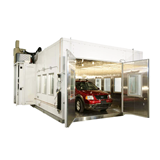The report, 'Directions in Australia's Automotive Industry 2017' confirms that Government inaction risks the industry's $37.1 billion (2.2% of Australia's GDP) annual contribution to the Australian economy.
Government cannot take for granted 370,000 Australian jobs, almost 70,000 businesses, or that 91% of Australian industries use some form of automotive products and services. Without urgent Government action through an industry and government partnership, the future and sustainability of the Australian Automotive industry and the wellbeing of those who depend on it cannot be guaranteed.
The report highlights a growing shortage of skilled automotive workers (25,000+ in 2017 to 35,000+ in 2018), which is the highest ever recorded in Australia. Vehicle repair and maintenance businesses which make 54% of all automotive businesses are experiencing the largest skills shortage, regardless of Holden, Ford and Toyota ceasing automotive manufacturing. Contributing to the shortage are uncoordinated government policies concerning automotive skills training, including apprenticeships, traineeships and vocational education; and the removal of some automotive professions from the skilled migration list.
'Directions in Australia's Automotive Industry 2017' details a true picture of the size and scope of Australia's
automotive industry, the current challenges it faces and emerging opportunities and critical policy areas requiring coordinated planning. It also reveals the impacts of a diminishing labour pool and poor perceptions of automotive professions. However, it also highlights the rapid deployment of technology, and emerging innovations such as hydrogen and electrical propulsion systems, autonomous vehicles and changing consumer behaviours.
A significant recommendation of the Senate Inquiry is the creation and funding of a Government and Industry Task Force to focus attention on skills shortages, national policy on emerging trends and industry transition. MTAA renews its call for government to favorably respond to the report recommendations.
The Motor Trades Association of Australia Limited (MTAA), the Motor Trades Associations of NSW, SA, WA, NT and Queensland and the Victorian and Tasmanian Automobile Chambers of Commerce commissioned the report in October 2016. It provides insight into the automotive industry, both at a national level and across each state by surveying 1000 automotive businesses nationwide and utilising cutting edge analysis to predict what lies ahead for the industry in the near future and beyond.








